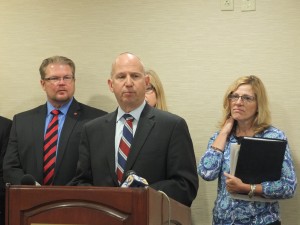DOVER – More than 160 emergency preparedness stakeholders attended the fifth annual Public Health Preparedness Symposium this week at Delaware Technical Community College’s Terry Campus in Dover. The Division of Public Health (DPH), Emergency Medical Services and Preparedness Section, planned the event for representatives of federal, state, and local government, and non-governmental organizations as a way to enhance communications between DPH and its stakeholders.
“DPH appreciates this opportunity to bring our partners together to have in-depth discussions about the state of emergency preparedness in Delaware,” said Dr. Karyl Rattay, DPH director. “Constant communication is critical so that when faced with a public health emergency, everyone is confident in their role and how to work cooperatively with other agencies to save lives and prevent the spread of potential diseases.”
Five plenary sessions with four breakout sessions covered topics including: Stop the bleeding, persons with access and functional needs, Delaware Overdose Survival Education (DOSE), and the Delaware Medical Reserve Corps (DMRC). Attendees also heard from Dr. Christina Herndon who assisted in the response to the Boston Marathon Bombing and discussed her experiences. Dr. Herndon then participated in a panel discussion on the topic of mental health issues during and after disasters along with representatives from the Department of Health and Social Services’ Division of Substance Abuse and Mental Health and Delaware State Police
Health threats are constantly evolving. Real or potential threats to Delaware have included H1N1, Ebola, Zika, Avian influenza, MERS, and whatever strains are circulating during the annual flu season, among others. Examples of DPH’s planning and preparedness efforts in the last year include leading Ebola planning and response efforts, the creation of a Zika Action Team, joining DEMA and the Citizens Corps to roll out the refreshed PrepareDE.org website, spearheading the planning of a health care facility evacuation exercise at Beebe Healthcare in Lewes, and drilling the Division’s ability to mass vaccinate the community at two recent flu clinics.
Funding for the symposium came from the CDC Public Health Emergency Preparedness (PHEP) grant. For Delaware preparedness resources, visit the PrepareDE.org website.
A person who is deaf, hard-of-hearing, deaf-blind or speech-disabled can call the DPH phone number above by using TTY services. Dial 7-1-1 or 800-232-5460 to type your conversation to a relay operator, who reads your conversation to a hearing person at DPH. The relay operator types the hearing person’s spoken words back to the TTY user. To learn more about TTY availability in Delaware, visit http://delawarerelay.com.
Delaware Health and Social Services is committed to improving the quality of the lives of Delaware’s citizens by promoting health and well-being, fostering self-sufficiency, and protecting vulnerable populations. DPH, a division of DHSS, urges Delawareans to make healthier choices with the 5-2-1 Almost None campaign: eat 5 or more fruits and vegetables each day, have no more than 2 hours of recreational screen time each day (includes TV, computer, gaming), get 1 or more hours of physical activity each day, and drink almost no sugary beverages.
